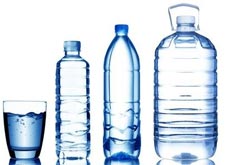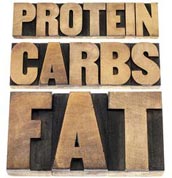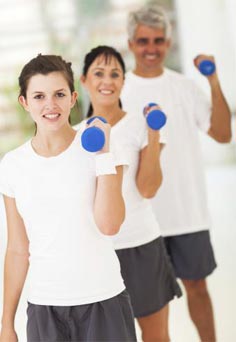HomePerformance Enhancement  There are many healthy alternatives to taking anabolic steroids or performance- enhancing substances. Strength training and eating the right foods can help you achieve the same goals without harming your body or putting you at risk for disqualification. Below are guidelines and suggestions for healthy meals.
There are many healthy alternatives to taking anabolic steroids or performance- enhancing substances. Strength training and eating the right foods can help you achieve the same goals without harming your body or putting you at risk for disqualification. Below are guidelines and suggestions for healthy meals.
Fluids
Below are important guidelines for replacing fluids before, during and after activity:
- Fluid needs = body weight x .67 for the number of ounces you require daily. This amount does not include fluid needed for exercise.
- Night before activity: Drink 16 ounces of water.
- Morning of activity: Consume 16 ounces of water as soon as you arise. If practice is later in the day, drink 16 ounces of water two hours before practice.
- Pre-exercise: Consume 6-8 ounces of water or sports drink 15 minutes before exercise. Avoid carbonated beverages or caffeine; you should avoid fruit juices before exercise as they can cause loose stools and gas.
- During exercise: Drink 4-8 ounces of water and sports drinks every 15 minutes, alternating between the two liquids. Sports drinks are required only for exercise lasting more than two hours.
- Post-exercise: Drink 16 ounces of fluid for every pound lost during exercise within two hours of exercise. Fluid options include water, sports drinks, lemonade and fruit punch.
- Avoid carbonated beverages, alcohol and caffeine, including energy drinks.
Potassium and Sodium Replacement
When you sweat during exercise your body becomes depleted of potassium and sodium, both vital for optimal health. These snack combination suggestions help you replace both potassium and sodium lost during exercise:
- Orange juice and salted pretzels
- Baked potato with ketchup or salt
- Nectarine and Chex mix
- Mix of dried apricots and salted nuts
Frequency of meals
 Meals should be smaller and more frequent to give you consistent fuel for your body. Smaller meals also allow you to digest food more quickly. Eat five or more meals every three to four hours every day for consistent energy.
Meals should be smaller and more frequent to give you consistent fuel for your body. Smaller meals also allow you to digest food more quickly. Eat five or more meals every three to four hours every day for consistent energy.
Carbohydrates
Intense training depletes carbohydrates stores, resulting in poor performance and increased fatigue. Carbohydrates should make up 60 to 65% of your diet.
Sources of carbohydrates include:
- bread
- bagels
- English muffins
- pita bread
- pasta
- cereals
- pretzels
- fruit juices
- popcorn
- vegetables
- sports drinks
- cereal bars
- Carbohydrates need to be consumed before, during and after workouts.
- Meals should be 2/3 carbohydrates and 1/3 protein.
- Carbohydrates should be consumed within 15 minutes after workouts or events. Examples include: Pop-Tarts, cereal bars, crackers, pretzels, dry cereal, bagels, graham crackers, Chex Mix, fruit drinks, frozen yogurt and fruit ice.
- Pre-exercise carbohydrates depend on your body size and the amount of time before competition.
Below are guidelines for a 60kg athlete:
- Four hours prior to competition:
Consume 3 cups of pasta, 1 cup of sauce, 1 dinner roll, and 16 ounces of juice
- 10 minutes before competition:
Consume a small plain bagel
- After competition:
Consume 1.5 g/kg of carbohydrates and 0.5 g/kg of protein in the first 15 minutes; consume the same amount two hours later. An example meal might include a plain sandwich with 2 ounces of meat, a banana, cereal and milk.
Protein
Your body cannot use more than one gram of protein per pound of body weight.
Sources of protein include:
- chicken
- fish
- beef
- pork
- veal
- turkey
- eggs
- cheese
- milk
- shellfish
- soy burgers
- dried beans
- nuts
Fats
Too much fat in your diet can cause cramps; however, too little fat may make you fatigue rapidly. Try to limit high-fat foods before and during exercise.
Foods to limit before and during exercise include:
- chips
- French fries
- pizza
- burgers
- ice cream
- doughnuts
- chocolate
- nuts
- fried meats
- bologna
- salami
- pepperoni
Examples of pre-event or workout meals:
- 3 hours before event:
Pasta, stir-fry, sandwiches, fajitas, eggs and toast, chicken, potato and vegetables and veggie burger.
- 2 to 3 hours before event:
Bagels, crackers, pretzels, smoothies, cereal and milk, waffles/pancakes and pasta salad.
- 1 to 2 hours before event:
Cereal bar, pretzels, fruit drink, toast, instant breakfast and nutritional shake.
- Evening Snacking:
Soft pretzels, cereal, crackers, popcorn, bagels, cereal bars, trail mix, frozen yogurt, pudding, fruit and fruit ice.
 Weight and Strength Gain
Weight and Strength Gain
By adding 10 to 14 extra grams of protein per day to your diet, you can add one pound of weight per week. Increase the number of meals — not the size of meals. You'll need to be consistent with diet and exercise to see gains. Do not rely on weight-gainer or high-protein powders — these will fill you up before you get all the calories your body needs.
The U.S. Anti-Doping agency has published "Optimal Dietary Intake - The Basics" to provide additional guidelines to help optimize dietary intake for sports competitors.
Teens may also want to consult http://www.kidshealth.org for answers and advice on food and fitness.
Resource Links
These off-site links offer further research on
Performance Enhancement.
 There are many healthy alternatives to taking anabolic steroids or performance- enhancing substances. Strength training and eating the right foods can help you achieve the same goals without harming your body or putting you at risk for disqualification. Below are guidelines and suggestions for healthy meals.
There are many healthy alternatives to taking anabolic steroids or performance- enhancing substances. Strength training and eating the right foods can help you achieve the same goals without harming your body or putting you at risk for disqualification. Below are guidelines and suggestions for healthy meals. Meals should be smaller and more frequent to give you consistent fuel for your body. Smaller meals also allow you to digest food more quickly. Eat five or more meals every three to four hours every day for consistent energy.
Meals should be smaller and more frequent to give you consistent fuel for your body. Smaller meals also allow you to digest food more quickly. Eat five or more meals every three to four hours every day for consistent energy.
 Weight and Strength Gain
Weight and Strength Gain